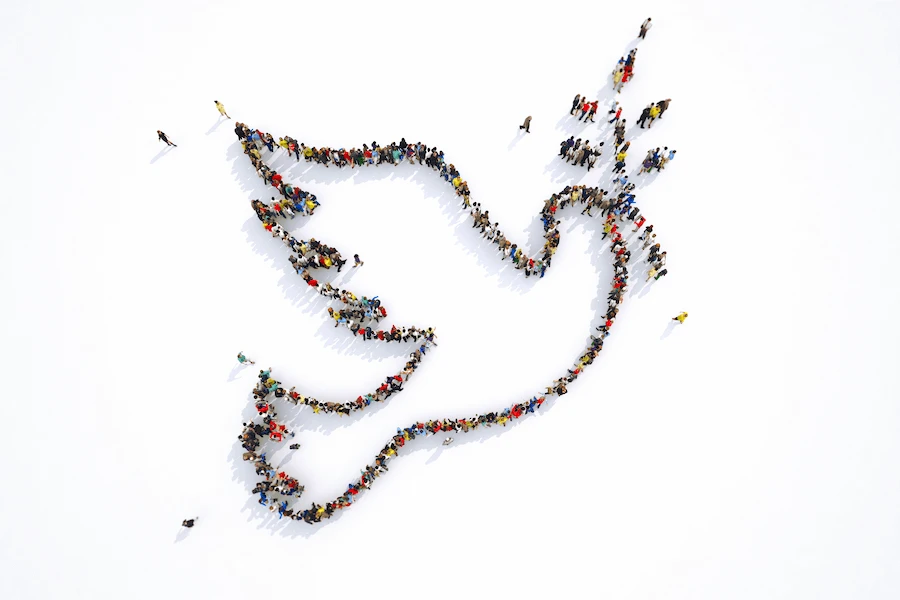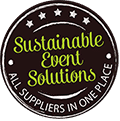As event planners, take a closer look at the Sustainable Development Goals, or SDGs for short. Integrating the SDGs into events is an important step on the road to sustainability. With conscious event planning and implementation of sustainable practices, your events can also make an important contribution to solving global problems and at the same time become a role model for sustainability. For this reason, today we present "SDG 16 - Peace, Justice and Strong Institutions".

SDG 16 - Peace, justice and strong institutions
That's what SDG 16 is all about:
- Promote peaceful and inclusive societies for sustainable development,
- Provide access to justice for all
- and build effective, accountable, and inclusive institutions at all levels.
This is what SDG 16 means for events
event can play an important role in promoting and achieving this goal. This is because they can draw attention to issues such as social justice, human rights, the rule of law and sustainable development.
Events can help strengthen local communities and promote awareness of local cultures and traditions.

Events that lead by example
The German Sustainability Award
This annual event recognizes companies, organizations and communities that have demonstrated excellence in sustainability. It promotes the implementation of SDG 16 by highlighting the importance of transparent and accountable institutions and encouraging companies to take responsibility for their social and environmental impacts.
The German Protestant Kirchentag
The Kirchentag aims to create a space for interreligious and intercultural dialogue. To this end, it brings together people from different backgrounds who can then discuss topics such as peace, justice and human rights. The program includes panel discussions, workshops, church services and cultural events. The Kirchentag also actively promotes justice and peace. To this end, it supports initiatives to combat poverty and inequality and speaks out against discrimination and racism. In addition, the Kirchentag emphasizes the importance of education and awareness-raising for the implementation of SDG16. It therefore also promotes cooperation between various educational institutions and civil society organizations.
The Copenhagen Legacy Lab
The Copenhagen Legacy Lab is an initiative of the Copenhagen Convention Bureau. The aim of the Lab is to offer a strategic and systematic co-creation process at conventions in Copenhagen. This includes networking with local business, experts, associations, NGOs and many more. This approach can have a positive and lasting impact on society and takes into account the UN Sustainable Development Goals. This service of the Lab is free of charge.

These immediate actions at events pay into SDG 16
Ensure responsible event planning and execution
As an event planner, you can and should ensure that you comply with environmental and social standards when planning and executing events.
For example, they can:
- Designate responsible persons for all areas and make them accessible,
- Introduce a transparent complaints management system,
- Countering bribery through transparency,
- Implement violence prevention and appropriate safety concepts with police and fire departments,
- Advocate for equality, inclusion and diversity
All this counteracts the oppression of women, minorities and other injustices. It also promotes a peaceful, liberal and pluralistic society.

Promote human rights and the rule of law
SDG 16 also means: As an event planner or service provider, consider human rights issues and social aspects in addition to environmental aspects. Third-party verifiability is becoming a question of future viability for the entire industry.
In addition, as the person in charge, you should have a legal cadastre and know the most important laws and regulations. These include:
- Occupational Safety and Health Act,
- Labor law,
- Supply Chain Due Diligence Act,
- Climate Protection Act,
- Commercial Waste Ordinance,
- Circular Economy Act,
- Ordinance on Places of Assembly
- and much more.

Promote education and knowledge
As planners, promote awareness of sustainability issues among your guests. Use your events as a platform to spread education and knowledge. I.e. let people have their say who stand up for other people. Cooperate with NGOs to actively work together against injustices worldwide. Think of NGOs like
- UNICEF,
- Greenpeace,
- B.A.U.M. e. V.,
- German Sustainable Business Association,
- Amnesty International,
- Human Rights Watch
- and many more.
They offer informational materials and speakers on a wide variety of topics.
Book suitable artists. Or create live entertainment concepts that stand up for peace - like Michael Patrick Kelly. He has integrated a minute of silence for the victims of wars into his concerts with his "Peace Bell", cast from Ukrainian weapons scrap.
We can use sustainable events to make sustainability, climate neutrality, cultural exchange, education and peaceful gathering tangible and natural for millions of people. By integrating all stakeholders, we can also promote sustainable entrepreneurship. It's not the ME that counts, but the WE!

Work with local communities
As event planners, you and your service providers can work closely with local communities. This will ensure that your events address community needs and concerns while promoting SDG 16.
Conclusion
If sustainable events become the standard, their high reach and variety creates an enormous potential to change the world in a positive way! Events become part of the solution - be an active part of it.
More information
Sabine Böhling, consultant, trainer and lecturer for sustainability and CSR, and Stefan Lohmann, expert for live entertainment concepts and founder of Sustainable Event Solutions, present the 17 SDGs and apply them to events. This series first appeared on tw-media, the meetings industry.
- more about the 17 Sustainable Development Goals
- more about the 16 Steps Initiative


